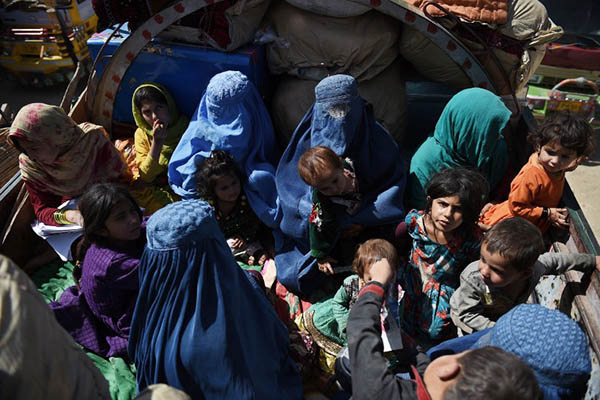
Wakil Kohsar—AFP
Human Rights Watch accuses UNHCR of ‘complicity’ in promoting exodus.
Pakistan is conducting mass repatriation of Afghan refugees through coercion, threats and abuse, Human Rights Watch said in a scathing report on Monday, accusing the U.N. refugee agency of complicity in promoting the exodus.
Hundreds of thousands of Afghans have been forced to return to their homeland, which is racked by conflict, poverty and unemployment, joining more than half a million others uprooted by war inside the country. The 76-page report, entitled Pakistan Coercion, U.N. Complicity: The Mass Forced Return of Afghan Refugees, called the mass repatriation the world’s largest forced return of refugees.
“After decades of hosting Afghan refugees, Pakistan in mid-2016 unleashed the world’s largest recent anti-refugee crackdowns to coerce their mass return,” said Gerry Simpson, a refugee researcher at Human Rights Watch. “Because the U.N. refugee agency (UNHCR) didn’t stand up publicly to Pakistan’s bullying and abuses, international donors should step in to press the government and U.N. to protect the remaining Afghan refugees in Pakistan.”
The report said a combination of insecure legal status, the threat of deportation during winter and police abuses—including extortion, arbitrary detention and nocturnal raids—had left the Afghan refugees with no choice but to leave Pakistan. It quoted a 26-year-old Afghan who was forced to return to Kabul with his wife and two children after Pakistani security forces stormed into their house. “In July, 11 soldiers and police came to our home at 3 a.m. They entered without asking and threw all our things on the floor. They demanded to see our refugee cards and said they were expired,” the man was quoted as saying. “Then they stole all our money and told us to leave Pakistan.”
The report was also critical of the UNHCR, saying that by doubling its cash grants to Afghans returning from Pakistan to $400, it was effectively promoting the exodus. “The U.N. refugee agency should end the fiction that the mass forced return of Afghan refugees from Pakistan is, in fact, mass voluntary return,” Simpson said. “If UNHCR feels that giving cash to returning refugees is the best way to help them survive in Afghanistan, it should at the very least make clear it does not consider their return to be voluntary.”
There was no immediate reaction to the report from the Pakistani government, which has previously cited security concerns and strains on its resources after nearly four decades for the repatriation. It has repeatedly extended deadlines for refugees to leave, most recently until December 2017.
UNHCR rejected the criticism. “The U.N. Refugee Agency shares concerns of Human Rights Watch regarding the pressures on Afghans in the late summer which affected the repatriation last year, but does not agree with the conclusions of its new report,” the U.N. body said in a statement. “The multiple drivers behind this surge… include pressures by authorities amidst broader security operations, changing attitudes among host communities, uncertainty about the renewal of refugee ID cards, economic hardship, stricter border controls disrupting trade and family ties.”
Some Afghan refugees have been sheltering in Pakistan since fleeing the Soviet invasion of 1979. Up to 2.4 million registered and unregistered Afghan refugees were estimated to be in Pakistan last year, though the figures have not been updated since the repatriation began. UNHCR listed it as the world’s third-largest refugee-hosting nation.
Conflict-torn Afghanistan is struggling to reabsorb large masses of refugees and failed asylum-seekers being sent back from Pakistan, as well as from Europe and Iran. The Afghan government, heavily reliant on foreign aid, has promised refugees land and cash grants but is struggling to deliver.
The growing influx has sent living costs soaring and daily wages falling in many areas. Safe areas are in any case decreasing as the government steadily loses territory to insurgents.
